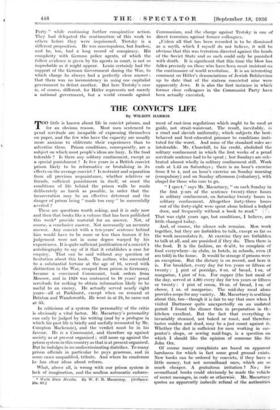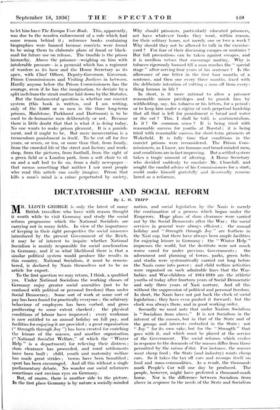THE CONVICT'S LIFE
By WILSON HARRIS
• on paper, and the few who have the capacity are usually more anxious to obliterate their experiences than to advertise them. Prison conditions, consequently, are a subject on which most people's ideas are hazy. Is the food tolerable ? Is there any solitary confinement, except as a special punishment ? Is five years in a. British convict prison likely to be reformative or brutalising in its effects on the average convict ? Is restraint and separation from all previous acquaintance, whether relatives or friends, sufficient punishment in itself, or must the conditions of life behind the prison walls be made deliberately as harsh as possible, in order that the incarceration may be an effective deterrent and the danger of prison being " made too easy " be successfully averted ?
These are questions worth asking, and it is only now and then that books like a volume that has been published this week* provide material for an answer. Not, of course, a conclusive answer. Not necessarily an accurate answer. Any convict with a ten-years' sentence behind him would have to be more or less than human if his judgement were not in some degree warped by his experiences. It is quite sufficient justification of a convict's autobiography to say of it that it establishes a case for enquiry. That can be said without any question or hesitation about this book. The author, who succeeded to a substantial fortune at the age of 16, served with distinction in the War, escaped from prison in Germany, became a convinced Communist, took - orders from Moscow, and in 1928 was sentenced to 10 years' penal servitude for seeking to obtain information likely to be useful to an enemy. He actually served nearly eight years—all at Parkhurst, except when on remand at Brixton and Wandsworth. He went in at 28, he came out at 35.
In criticisms of a system the personality of the critic is obviously a vital factor. Mr. Maeartney's personality can only be judged by his writing (and by a prologue in which his past life is briefly and usefully recounted by Mr. Compton Mackenzie), and the verdict must be in his favour. He is a Communist, and therefore up against society as at present organised ; still more up against the prison system in this country as that is at present organised. But he indulges in no undiscriminating diatribes. To many prison officials in particular he pays generous, and in some cases unqualified, tribute. And where he condemns he has clear ideas about reform.. .• What, above all, is wrong with our prison system-is lack of imagination, and the soulless automatic enforce-
* Walls Have Mouths. By W. F. R. Macartney. (Gollanez.
10s. 6d.) ment of cast-iron regulations which ought to be used as guide, not strait-waistcoat. The result, inevitably, is a cruel and slavish uniformity, which subjects the best, behaved and best-educated prisoner to conditions insti- tuted for the worst. And some of the standard rules are intolerable. Mr. Churchill, to his credit, abolished the solitary confinement in which the first weeks of a penal servitude sentence had to be spent ; but Sundays are cele- brated almost wholly in solitary confinement still. Work ends at 1.45 on Saturdays ; there is an hour's -exercise from 3 to 4, and an hour's exercise on Sunday morning (compulsory) and on Sunday afternoon (voluntary), with chapel for those who care to go.
" I spent," says Mr. Macartney, " on each Sunday in the first ymrs of the sentence twenty-three hours in solitary confinement, on Saturday twenty hours in solitary confinement. Altogether forty-three hours out of the forty-eight were spent alone behind a loOked door, and frequently without a book to read:" That was eight years ago, but conditions, I believe; are little changed today.
And, of course, the silence rule remains. Men work together, but they are forbidden to talk, except so far as the work necessitates it. At exercise they are forbidden to talk at all, and are punished if they do.' Then there is the food. It is the fashion, no dcubt, to complain' of food everywhere—in clubs, in hotels, in schools, even (I am told) in the home. It would be strange if prisons were an exception. But the dietary is on record, and here it is. For breakfast, every day for ten years or fifteen or twenty : / pint of porridge, 8 oz. of bread, 1 oz. of margarine, 1 pint of tea. For supper (the last meal of the day, served at 4.30) every day for ten years or fifteen or twenty : 1 pint of cocoa, 10 oz. of bread, 1 oz. of cheese, 1 oz. of margarine. The mid-day meal alone provides scope for any variety. Mr..Macartney is scathing about this, too—though it is fair to say that once when I visited Dartmoor quite unexpectedly on an undated permit I found the dinner then in preparation in th3 kitchen excellent. But the fact that everything is invariably steamed, not baked or roast, and therefore tastes sodden and dead, may be a just count against it. Whether the diet is sufficient for men working in car- penter's shops, or sewing mail-bags, is a question on which I should like the opinion of someone like Sir John Orr.
Of course many complaints are based on apparent harshness -for which- in fact some good ground exists. New books can be ordered by convicts,- if they have a little money, -but not secondhand ones, which are so much cheaper. A gratuitous irritation ? No ; for secondhand books could" obviously be made the vehicle of secret messages; in code or otherwise. Mr. Macartney quotes an apparently imbecile refusal of the authorities to let him have The Europa Year Book. This, apparently, was due to the wooden enforcement of a rule which had some reason behind it ; reference books containing biographies were banned because convicts were found to be using them to elaborate plans of fraud or black- mail for future use on release. The trouble is the prison hierarchy. Above the prisoner—weighing on him with intolerable pressure—is a pyramid which has a regiment of ,warders as its base and the Home Secretary as its apex, with . Chief Officer, Deputy-Governor, Governor, Prison Commissioners and Visiting Justices in between. Hardly anyone below the Prison Commissioners has the courage, even if:he has the. imagination, to deviate by a split inch from the strait routine laid down by the Statutes: But the fundamental question is whether our convict system (this book is written, and I am writing, only of the 2,000 or so men in the three long-term prisons, Maidstone, Parkhurst and Dartmoor) is to be used to de-humanise men deliberately or not. Because there is little doubt that that is what it is doing today. No one wants to make prison pleasant. It is a punish- ment, and it -ought to be. -But mere incarceration is a tremendotts, punishment in itself. To be cut off for five years, or seven, or ten, or more than that, from family, from the crowded life of the street and factory and work- shop, from the' pictures, from football, from the sight of a green field or a London park, from a soft chair to sit on and a soft bed to lie on, from a daily newspaper— that means something that neither I nor most people who read this article can easily imagine. Prison that kills a man's mind is a crime perpetrated by society. Why should prisoners, particular15.- educated prisoners, not . have whatever books they want, within reason, for their solitary hours, not merely one or two a week ? Why should they not be allowed to talk in the exercise- yard ? For fear of their discussing escapes or mutinies ? But full precautions can be taken against escapes, and it is needless vetoes that encourage mutiny. Why is tobacco rigorously banned till a man reaches the " special stage " after serving four years of his sentence ? Is the allowance of one letter in the first four months of a sentence, and then one every three months, fixed with the deliberate intention of cutting a man off from every- thing human in life ?
- In .short, is it more rational to allow a prisoner reasonable minor privileges and to punish him by withholding, say, his tobacco or his letters, for a period ; or to keep him under a regime of such perpetual hardship that all that is left for punishment is bread and water or the cat ? This, I shall be told, is sentimentalism. Is it ? Or common sense ? It is being tried with reasonable success for youths at Borstal ; it is being tried with reasonable success for short-term prisoners at Wakefield. It is fully time that conditions in the convict prisons were reconsidered. The Prison Com- missioners, as I-know, are humane and broad-minded men; and conditions are in fact. improving. But a settled systenv takes a tragic -amount of altering. A Home Secretary who decided suddenly to emulate Mr. .Churchill. and sought the candid advice of his Commissioners for a starti could make himself gratefully and deservedly remem- bered as a reformer.











































 Previous page
Previous page